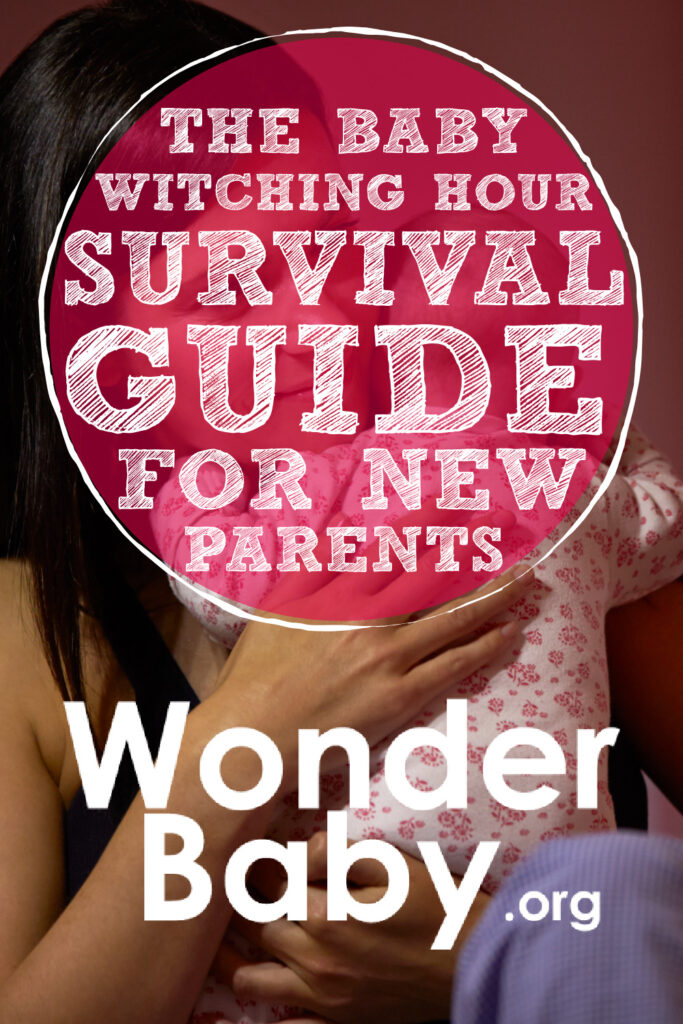The Baby Witching Hour Survival Guide for New Parents

- The baby witching hour refers to a period of increased fussiness.
- When your baby’s witching hour starts, they might experience an inconsolable crying spell, cluster feed, be restless, or need extra attention.
- The witching hour typically affects all young babies, but each experiences it differently.
- You should stay calm and composed during the witching hour.
- Trust your parental instincts and seek medical advice if your baby’s fussiness is concerning.
Does it feel like your sweet little one is replaced with a crying baby every late afternoon? If so, you might be experiencing what’s called the baby witching hour. It peaks at around six weeks, and from experience, I know that giving up on parenthood at that point can feel like the best option.
I promise you’re not alone. Many babies get extremely fussy around this time of the day.
With an understanding of what the baby witching hour is and why it happens, along with some helpful tips, you’ll be able to get through this difficult phase. While it’s normal for babies to experience a witching hour, there are some situations when you may want to seek outside help.
What is the Baby Witching Hour?

The baby witching hour is a general term used to describe a period when infants tend to be fussier and harder to soothe.
If your little one is typically calm and content but cries intensely during the late afternoons or early evening hours—when the sun starts to set and you’re settling in for the night—you’re likely experiencing the witching hour.
This happens more than you may think and is understandably challenging. The exact reason why it happens varies. But babies outgrow it.
All babies experience the witching hour. It just doesn’t affect them the same. Factors like your baby’s temperament, sleep patterns, feeding routines, and overall health can play a role in how strongly the witching hour hits.
The baby witching hour also shares similarities with colicky babies. However, it’s not the same thing.
Colicky babies cry intensely and frequently, often for no apparent reason, for more than three hours a day, three days a week, for three weeks or more. Their fussiness is persistent and can feel like it’ll last forever!
Both situations can test your patience, but colic goes beyond the witching hour.
If you find yourself in the middle of either, know you’re not alone.
What Should Parents Do During the Baby Witching Hour?

Dealing with the witching hour can feel like navigating a labyrinth. Your baby is unique, and it might take some trial and error to figure out the best approach.
Here are seven things you can do to get through this tough few hours:
Stay calm: It’s easier said than done, but so important. Babies can sense your energy, so try to stay relaxed and composed. A calm presence can work wonders.
If you feel overwhelmed, take turns with your partner or get a friend or other family member to help. You can also do breathing exercises or listen to your favorite music or podcast while trying to soothe your little one.
A 2011 study published in the Journal of Pediatric Health Care11. Megel, M. E., Wilson, M. E., Bravo, K., McMahon, N., & Towne, A.. Baby Lost and Found: Mothers’ Experiences of Infants Who Cry Persistently. Journal of Pediatric Health Care. ;25(3), 144–152. https://doi.org/10.1016/j.pedhc.2009.10.005 found that mothers dealing with irritable infants felt incompetent and as though they had lost the babies they knew.
Maternal and paternal mental health is a growing concern. You should prioritize yourself and reach out for help if it feels like you’re struggling to get through the witching hour with your little one.
Food: Sometimes hunger plays a role in fussiness. You should ensure your baby is well-fed. Offering a feeding session or soothing them with your breast or a bottle could work. Hydrate and keep yourself fed too!
Comfort: Your baby may need some comfort to help them through this period. Hold, rock, or swaddle your child to mimic the womb by creating a cozy cocoon of calmness.
White noise: A gentle humming, a fan, or a white noise machine could help your little one recenter. YouTube also has many sounds available if you need a different option.
White noise can help drown out the outside chaos and create a peaceful environment.
Change of scenery: Sometimes, walking into another room or going outside for fresh air can do wonders. Carry your baby around the house or step out for a stroll.
Baby massage: A gentle baby massage can help soothe your little one. Focus on areas like their back, tummy, or feet. You could also gently comb through their hair. Repetitive moves can have a calming effect.
Witching hour routine: If your baby is experiencing the witching hour night after night, getting into a routine might help. Try a warm bath followed by a story or lullaby during this time. If you stick to a routine, your little one will soon understand when it’s time to wind down.
Why Does the Baby Witching Hour Happen?

The witching hour is still somewhat of a mystery. It’s not entirely understood, but a few theories about why babies experience this exists.
Here are some possible reasons why your baby is acting up during the witching hour and how you can try to prevent it:
Your Baby’s Sleep-Wake Patterns are All Over the Place
Babies, especially newborns, are still getting the hang of their sleep-wake cycles. They also experience a ton of sleep regressions while they’re developing.
This could make their internal clock wonky, leading to increased fussiness.
Following a bedtime routine and creating good sleep habits might help you sail through this period without much disturbance.
Your Baby is Overstimulated
Babies are bombarded with new sights, sounds, and sensations throughout the day. By the time the sun sets, they may feel overstimulated.
An overstimulation outburst can happen without warning.
If you think this is the cause of your little one’s fussiness, the best approach is to help center them.
Give your baby a break from bright lights, loud noises, and excessive activity. Swaddle or hold them, or use soothing sounds. Skin-to-skin contact, sucking on a pacifier, a back or tummy rub and baby wearing could also do the trick.
Your Baby is Cluster Feeding
Babies go through many growth spurts, and when they do, they often need to feed more frequently. Cluster feeding can sometimes happen during the witching hour. And it affects breast and bottle-fed babies.
If your little one is fussier than usual, feeding them could help.
Cluster feeding is their way of boosting milk supply and ensuring they get the extra nourishment they need to grow.
Your Baby Has Digestive Discomfort
Sometimes, digestive issues can peak during the evening. This includes gas pains, colic, reflux, lactose sensitivity or intolerance, and an immature digestive system.
All of these can be real troublemakers and cause extreme discomfort after a day’s buildup.
If you suspect your little one has digestive issues, you should consult your pediatrician.
You can also soothe your baby in an upright position and ensure they’re not over- or underfed. If your baby is younger than six months and you’ve been introducing solids, cutting back might be the answer. Immature digestive systems are more susceptible to digestive discomfort from food.
Your Baby is Tired
Overtiredness can lead to increased fussiness. As your baby struggles to settle down, their tiredness can amplify their irritability.
Babies fight sleep for various reasons. Some of these include the fear of missing out, developmental excitement, and overstimulation. And all can lead to overtiredness.
It’s better to prevent your baby from getting too tired. Soothing them when they already are can be difficult. You should pay close attention to their sleep cues and establish a sleep routine.
If you missed their cues, try swaddling or holding your baby close to you. You can also try to move them to a sleep-inducing room or offer something they find comfort in.
How to Tell if Your Baby Is Experiencing a Witching Hour

The baby witching hour might not involve broomsticks, but it will definitely cast a spell of fussiness over your little one!
The first sign that your baby might be experiencing the witching hour is the time of day. Most babies go through it around 5 or 6 p.m. It can last for a few hours.
More indicators are:
- Increased fussiness and excessive crying that seem to come out of nowhere.
- Typical soothing techniques, like rocking or feeding, that don’t seem to work.
- Cluster feeding.
- Restlessness.
- Discomfort and increased gassiness.
- A need for extra attention, like being clingy and seeking closenes.
All babies experience the witching hour differently, and some may sail through it with no issues at all.
If you notice these signs in the late afternoon or early evening, know you’re not alone. Many parents go through it. The key is to stay patient, offer comfort, and know it will pass.
When to Seek Medical Advice
While the witching hour can be a normal phase, certain situations call for professional interference. If any of this happens during the witching hour, it’s best to reach out to your pediatrician immediately:
- Your baby is consistently fussy during or after feedings, and you’re worried about their health.
- Your baby is extremely irritable or lethargic for more than a few hours surrounding the witching hour.
- Your baby has a temperature above 100.4°F (38°C).
- Your baby vomits or has loose or bloody stools.
- Your baby has difficulty breathing, breathes rapidly, or has a persistent cough.
- Your baby’s urine output decreases, and they have a dry mouth or sunken fontanelles.
- Your baby develops a rash that’s unusual and spreads rapidly.
- Your baby is unresponsive.
You should also follow your intuition. Trusting your parental instincts is vital. If something doesn’t feel right, even if you can’t pinpoint a specific concern, it’s perfectly okay to reach out to your pediatrician for guidance and reassurance.
Turn the Cries Into Calm

When you’re in the midst of the baby witching hour, it can feel like your little one will stay awake forever and never stop crying. As a new parent, this period can be shattering.
But with each soothing touch, gentle lullaby, and comforting embrace, you’re casting your own spell of love and reassurance. Your patience and calm will help you and your little one overcome the storm.
Try to embrace this challenge, and trust your instincts.
Reference
- Megel, M. E., Wilson, M. E., Bravo, K., McMahon, N., & Towne, A. (2011). Baby Lost and Found: Mothers’ Experiences of Infants Who Cry Persistently. Journal of Pediatric Health Care, 25(3), 144–152. https://doi.org/10.1016/j.pedhc.2009.10.005

Related Posts

Sleep, Special Needs
Safe Place Bedding Travel Bed Review
Traveling with a special needs child can be stressful! Having a safe, durable, and easy to use travel bed can make traveling so much easier!

Sleep, Special Needs
Sleep Regimen for Premature Babies: Special Considerations
It can take premature babies much longer than their full-term peers to sleep for long stretches. A preemie sleep schedule may encourage better sleep.

Sleep
Mastering the Bedtime Routine: 3 Tips for a Peaceful Night’s Sleep
From around six weeks, a newborn bedtime routine can help your baby learn the difference between day and night and prepare for a restful night’s sleep.